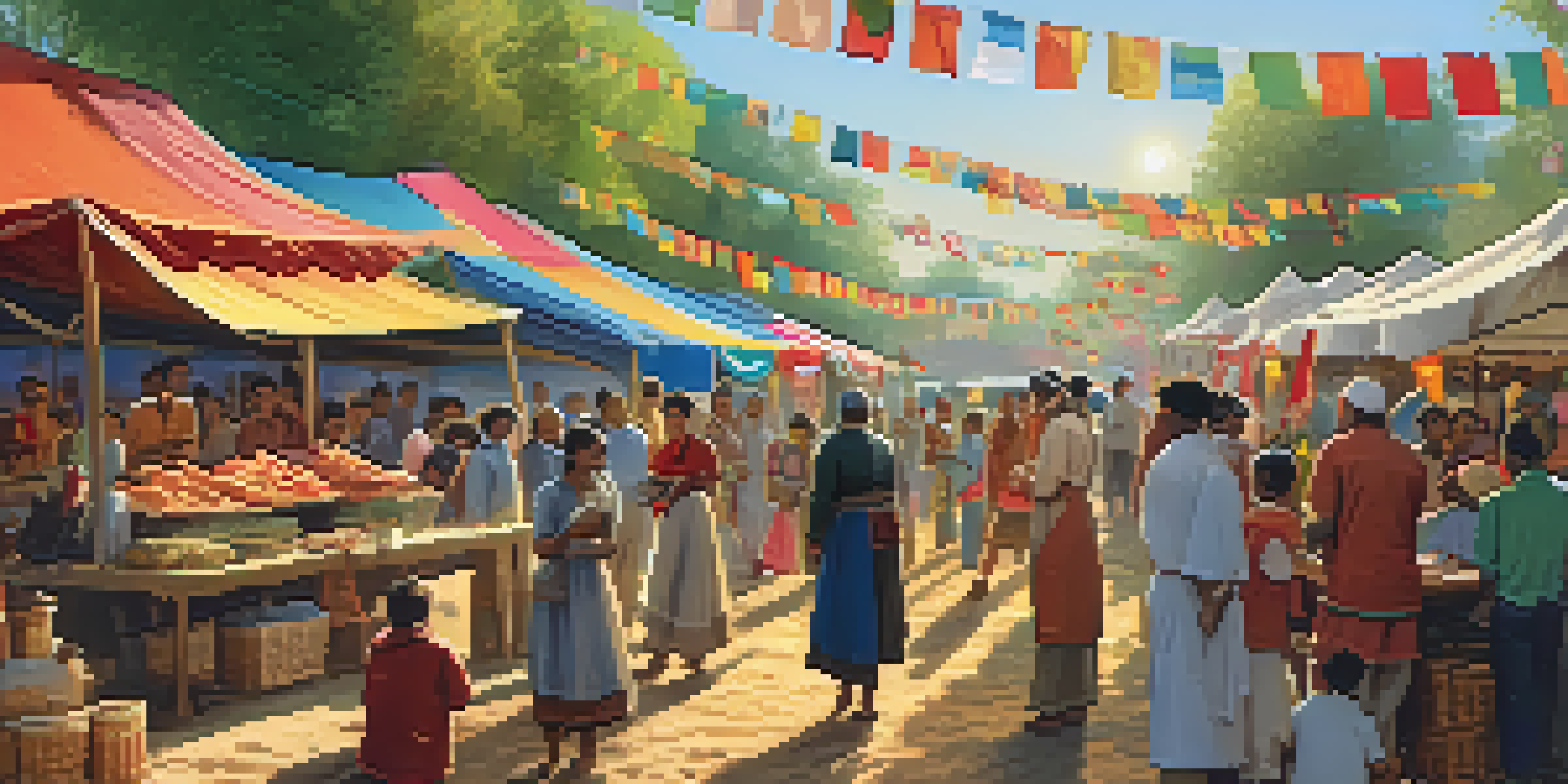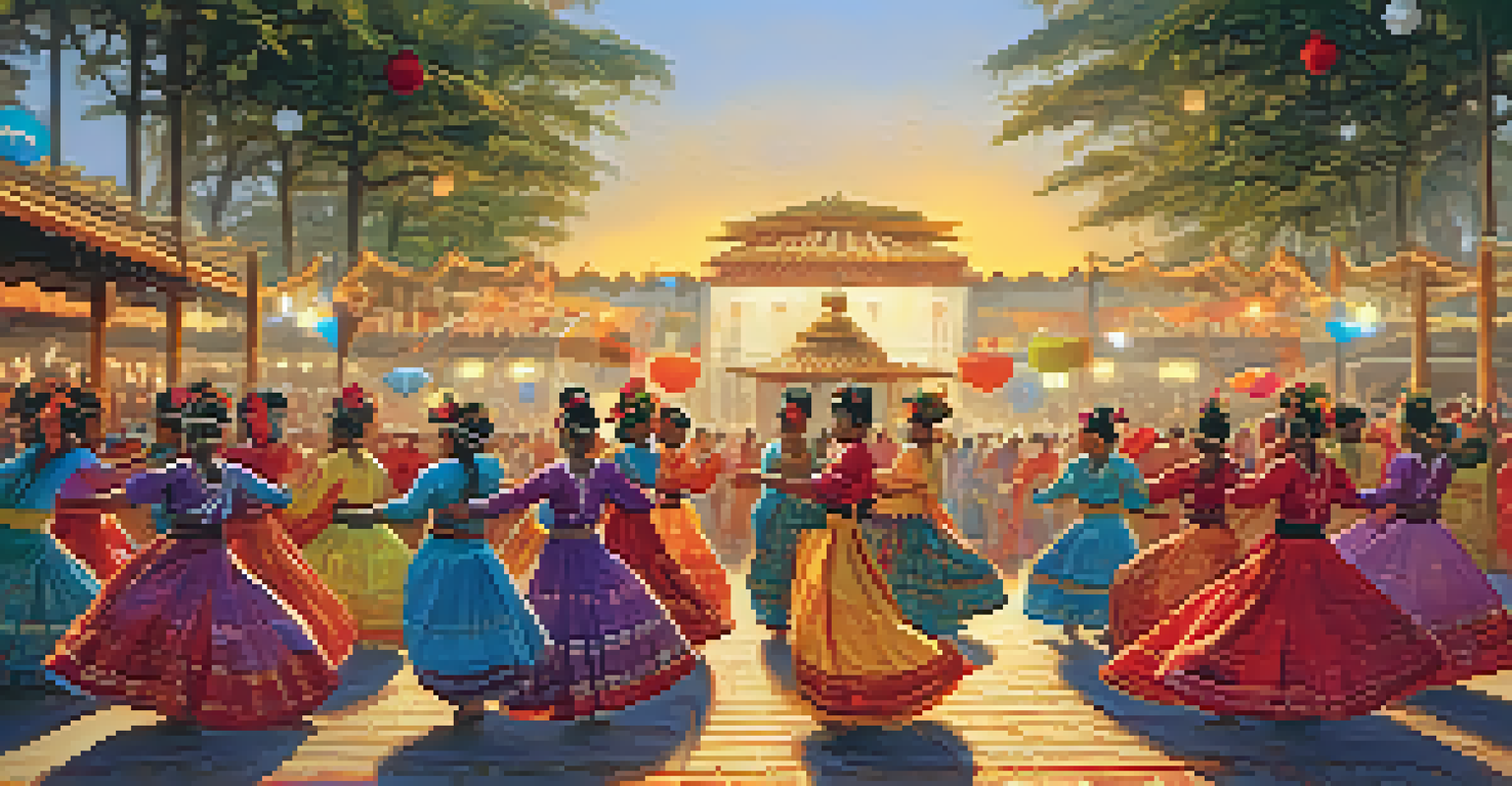Cultural Festivals: Experiencing Rural Heritage Through Celebration

The Essence of Cultural Festivals in Rural Communities
Cultural festivals play a vital role in rural communities, acting as vibrant expressions of heritage and identity. They bring together locals and visitors, fostering a sense of belonging and pride in one’s roots. Through music, dance, and traditional crafts, these events showcase the unique stories and customs that define rural life.
Cultural festivals are the heartbeat of a community's identity, where heritage is celebrated and shared with both locals and visitors.
Imagine walking through a bustling festival, the air filled with the aroma of local cuisine and the sounds of laughter and celebration. This lively atmosphere creates a space where generations can share experiences and pass down traditions. It’s not just about the fun; it’s a heartfelt connection to the past and a way to keep culture alive.
Moreover, these festivals often highlight the importance of community involvement and cooperation. Organizing such events requires teamwork and collaboration, reinforcing social bonds and encouraging communal responsibility. In essence, cultural festivals are a celebration of not just heritage, but also of community spirit.
Popular Rural Festivals and Their Unique Flavors
Every rural festival has its own flavor, often influenced by local history, customs, and natural resources. For instance, the Garlic Festival in California celebrates the region’s garlic production with food, contests, and live entertainment. Such events highlight not only local produce but also the creativity and innovation of the community.

Similarly, the Highland Games in Scotland showcase traditional athletic competitions and cultural performances, immersing attendees in the rich Scottish heritage. These festivals are not just events; they are immersive experiences where people can witness and participate in age-old traditions, creating lasting memories.
Cultural Festivals Unite Communities
These events foster a sense of belonging and pride, connecting locals and visitors through shared heritage and traditions.
From colorful parades to art exhibitions, each festival provides a unique insight into the local way of life. They serve as a reminder of the diversity of cultures and the importance of preserving these traditions for future generations. Attending these festivals is like embarking on a cultural journey, filled with learning and discovery.
The Role of Food in Cultural Celebrations
Food is often at the heart of cultural festivals, serving as a delicious gateway to understanding local heritage. Traditional dishes tell stories of the land, climate, and history, connecting people to their roots. For instance, at a rural festival, you might find homemade pies, stews, or specialty drinks that have been passed down through generations.
Food is a central feature of cultural festivals; it is a way to connect with our roots and share our stories with others.
Beyond mere sustenance, food acts as a social glue, bringing people together in joyful sharing and celebration. Imagine sitting at a long table with strangers who quickly become friends as you share a meal. This communal aspect transforms food into an experience that fosters connections and builds community.
Moreover, culinary demonstrations during festivals can educate attendees about traditional cooking methods and the significance of certain ingredients. By engaging with food in this way, people not only enjoy a feast for their senses but also gain deeper appreciation for the culture and traditions that shaped these dishes.
Music and Dance: The Heartbeat of Cultural Festivals
Music and dance are often the lifeblood of cultural festivals, infusing energy and excitement into the atmosphere. These art forms serve as expressive mediums through which stories and emotions are shared, and they often have deep cultural significance. For example, traditional dances may symbolize historical events or celebrate seasonal changes.
During festivals, you might find local musicians playing folk songs that echo the community’s history, while dancers in vibrant costumes bring these stories to life. This dynamic interaction creates a captivating spectacle, drawing attendees into the rhythm and spirit of the celebration. It’s a joyful reminder of the power of art to unite and inspire.
Food as a Cultural Connector
Food plays a central role in festivals, bringing people together and providing a delicious gateway to understanding local heritage.
Furthermore, participating in these performances allows festival-goers to immerse themselves fully in the culture. Whether it’s joining a circle dance or clapping along to a tune, these moments create lasting bonds between people, transcending language and cultural barriers. Ultimately, music and dance are not just entertainment; they are vital expressions of community identity.
Crafts and Arts: Celebrating Local Talent
Crafts and arts are integral to many cultural festivals, showcasing the talent and creativity of local artisans. From pottery and weaving to woodworking and painting, these handmade items reflect the skills and traditions honed over generations. Attendees often have the chance to purchase unique items that tell a story of the community’s heritage.
Moreover, festivals often include workshops where visitors can learn traditional crafting techniques from skilled artisans. This hands-on experience not only preserves these arts but also encourages appreciation for the craftsmanship involved. Imagine learning to weave a basket or paint a traditional design, gaining insights into the cultural significance behind these crafts.
In addition to promoting local talent, these artistic displays can also inspire pride within the community. By valuing and celebrating their own crafts, communities reinforce their identity and heritage. This cycle of creation, appreciation, and preservation is what makes cultural festivals a vital part of rural life.
The Impact of Cultural Festivals on Rural Economies
Cultural festivals have a significant positive impact on rural economies by attracting visitors and boosting local businesses. When people come to enjoy a festival, they often spend money on food, crafts, lodging, and transportation, providing a much-needed economic boost. This influx of visitors can make a huge difference for small towns and communities.
Moreover, these events encourage entrepreneurship, as local artisans and food vendors showcase their products. Many festival-goers are eager to support local businesses, leading to increased sales and visibility for these vendors. This not only benefits individual entrepreneurs but also strengthens the local economy.
Festivals Boost Rural Economies
Cultural festivals attract visitors, enhancing local business and encouraging entrepreneurship, which strengthens rural economies.
Additionally, successful festivals can lead to increased tourism year-round, as visitors who enjoyed their experience may return or recommend the community to others. In this way, cultural festivals create a ripple effect, fostering economic growth and sustainability while celebrating the unique heritage that attracts people in the first place.
Preserving Cultural Heritage Through Festivals
Cultural festivals are essential for preserving and promoting local heritage, ensuring that traditions are passed down through generations. By celebrating their history, communities foster a sense of pride and ownership over their cultural identity. This process of preservation is crucial, especially in a world that often leans towards globalization.
Engaging younger generations in these festivals helps instill a sense of tradition and responsibility towards their cultural heritage. When children participate in activities like traditional dances, crafts, and storytelling, they learn the value of their history and the importance of keeping it alive. This intergenerational exchange strengthens community bonds and cultivates appreciation for cultural diversity.

Moreover, festivals can serve as platforms for education, allowing attendees to learn about the history and significance of various traditions. By incorporating workshops, performances, and discussions, these events create opportunities for dialogue and understanding. Ultimately, cultural festivals are not just celebrations; they are vital tools for preserving and revitalizing rural heritage.